Looking for the best outsourcing companies?
Outsourcing has gained tremendous popularity because delegating business processes to the right companies can improve organizational efficiency greatly.
However, choosing the right outsourcing service for your needs can be confusing at first!
To help you out, this article will cover the biggest outsourcing companies in the world, their services, and how your business can benefit from them.

Table of Contents
- What is outsourcing?
- 4 amazing benefits of outsourcing work
- The best outsourcing companies in the world
- Choosing between outsourcing companies
Let’s get started.
What is outsourcing?
Outsourcing is the process where a business delegates certain non-core business process activities to a third party.
The third party can be dedicated outsourcing companies from your home (onshoring), a foreign country (offshoring), or individual freelancers.
So what’s offshoring?
Outsourcing software development, marketing, and other business process activities to another country are called offshoring. While you can outsource to companies within your country (onshore), most companies prefer to outsource to other low-cost countries.
Why?
Because they usually have lower costs and salaries – which helps you save more money!
What work can you outsource?
Ideally, you should only outsource non-core business process activities.
Non-core work is any activity that your business doesn’t necessarily specialize in.
For example, social media marketing or human resource management is not a core business activity for a company focused on front-end mobile app development.
Sure, it’s important – but it’s not what the company focuses on.
As you outsource these non-core activities, your in-house employee will have more time and resources to spend on the activities that you actually specialize in.
Here’s a list of some common tasks that you can outsource:
- Administrative work.
- Software outsourcing, like custom software development.
- Marketing activities.
- HR outsourcing activities.
- BPO service (customer service, Big Data analytics, etc.)
- Quality assurance solution.
- Financial services.
- Mobile app development for iOS and Android platforms.
- Web development services using languages like PHP.
Now that we’ve covered what’s outsourcing, let’s check out how it can help your business.

4 amazing benefits of outsourcing work
There are tons of benefits to outsourcing your non-core tasks.
Here’s a closer look at them:
A. Reduced costs
One of the biggest reasons why companies opt to outsource their service is to reduce costs.
How?
When you hire an outsourced team, you don’t have to invest in training and setup costs.
These outsourced teams usually consist of skilled professionals with the right equipment to expertly handle your work from the get-go.
What’s more?
You can save on salary costs by outsourcing to countries with lower salaries, such as the Philippines, Ukraine, Poland, or India.
B. Easy to scale up
When your business grows, there are tons of additional costs you’ll have to take care of.
These can range from:
- Leasing larger offices
- Hiring more employees
- Investing in more equipment
- And so on!
When you outsource, you can bypass a lot of these additional costs for the time being, as most outsourcing companies handle all of this themselves.
This way, you can continue growing without worrying about the associated costs holding you back initially.
C. Free up internal resources for core activities
By outsourcing repetitive and time-consuming work, your employees can dedicate their time and energy to higher-order tasks like strategizing and planning.
Think about it.
Would you rather have your in-house team spend hours on administrative tasks or focus on building better client strategies and increasing team collaboration?
Outsourcing ensures that you make the best use of your employees’ capabilities.
D. Keep your businesses running 24/7
Keeping your business running around the clock will cost a lot of money, right?
To ensure your business runs 24 hours a day, you’ll probably have to cover the wages of 3 shifts of employees!
So how does outsourcing help you?
Outsourcing can help you easily keep your business running around the clock at a fraction of the cost.
If you’re based in the United States, and outsource to a country like India – your software outsourcing team can keep things running smoothly even when your onsite employees have clocked out and gone home.
Additionally, as your outsourced team is based in a country with lower salaries, you’ll save tons of money!
This can help you maintain 24×7 service channels to cater to clients and customers round the clock.
The best outsourcing companies in the world
Choosing the right outsourcing company for your business could be a problem, as there are thousands of outsourcing companies across the world!
To help you get started, let’s take a look at some of the biggest outsourcing companies and the specific services they specialize in:
1. Nearsol
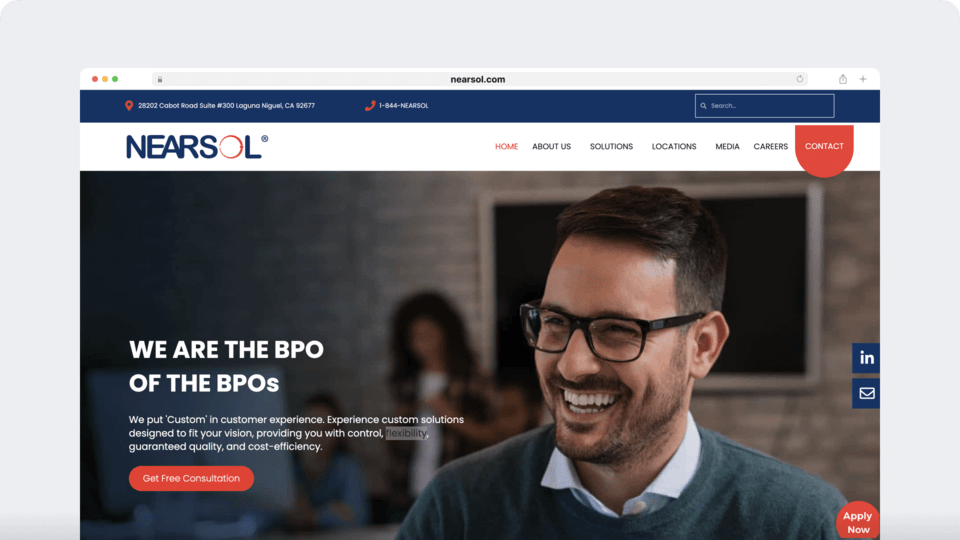
With headquarters in California, Nearsol initially provided telecommunication services for real estate businesses. Today, it’s a global outsourcing company with business operations in regions like Asia-Pacific and Latin America. Nearsol has won numerous awards for quality and service.
Major clients: Crawford, Pacific Star Financial
Outsourcing services:
- Facility implementation
- HR outsourcing services
- Call centers.
2. Shockwave Media

Shockwave Media is a cutting-edge outsourcing partner with headquarters in Australia that helps any small business scale online. They offer a complete digital transformation service like corporate marketing strategy, human resource management, and lead generation with an easy onboarding process.
Outsourcing services:
- Video production
- Staff management
- Web development
3. Acquire BPO

Based out of Australia, Acquire BPO is an award-winning business process outsourcing company with a presence in over 14 locations like the US, Australia, and the Philippines. It offers various technical, sales outsourcing, and software solutions.
Major clients: Dominos, KFC, Samsung
Outsourcing services:
- Software development
- Accounting and Bookkeeping
- Customer support
4. Live ChatMonitoring
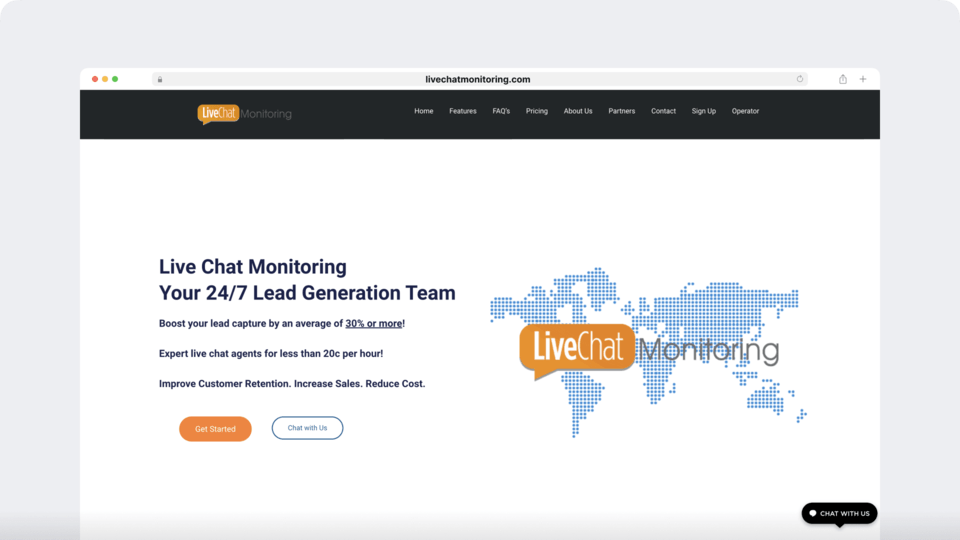
Live ChatMonitoring is a BPO company with headquarters in Australia that offers 24/7 live chat support to companies of all kinds, from software development to consumer products.
Major clients: Opteon, RateOne, Loan Studio
Outsourcing services:
- 24/7 lead capture
- Co management services
- Customer support
5. Verticurl

Founded in Singapore, Verticurl is a marketing service agency aiming to boost customer engagement and revenue generation for multinational brands. The company offers a sales team in over 14 languages with expertise in industries like manufacturing, healthcare, and banking.
Major clients: Fonterra, Red Hat
Outsourcing services:
- Demand and lead generation
- Data services
- Performance management
6. Programmers.io

Programmers.io is an India based software development company that offers affordable IT services on multiple platforms like Java, IBM, Dot Net, etc. It’s also an IBM-certified software outsourcing company and a Microsoft Gold partner.
Major clients: Dell, Scheels
Outsourcing services:
- Quality Assurance
- Custom software development
- Backend development
- Mobile app development
7. Hello Rache
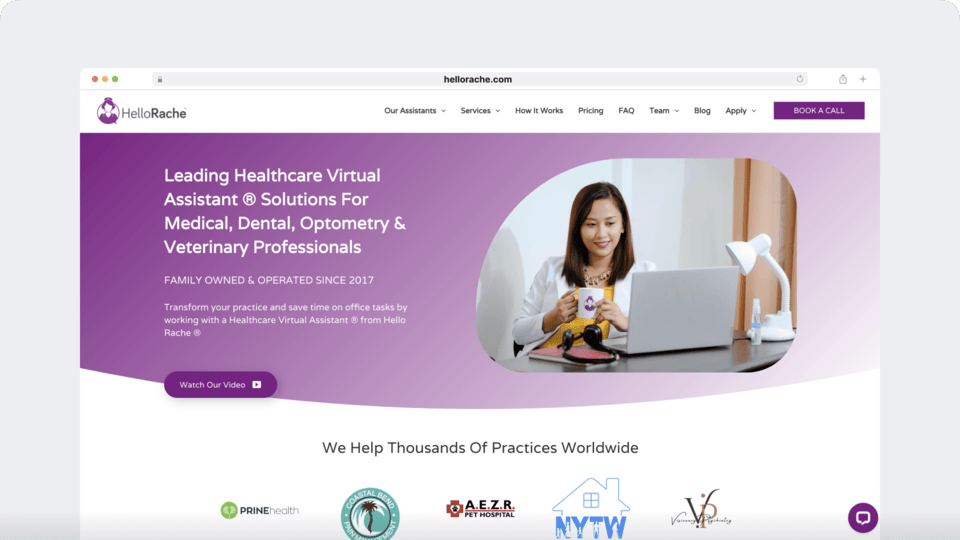
Founded by a US physician in Arizona, Hello Rache offers a virtual assistance solution for medical, dental, and veterinary professionals. It provides assistants who are trained in privacy policies and HIPPA guidelines.
Major clients: In The Black, New York Therapy and Wellness
Outsourcing services:
- Virtual administrative assistant
- Virtual receptionist
8. Tata Consultancy Services

TCS, or Tata Consultancy Services, is the biggest Indian Information Technology (IT) outsourcing company and consulting service. A subsidiary of the Tata group, this IT consultancy and services firm operates in 46 countries like China, Belgium, and Poland.
Major clients: Citi, B&O, Qantas, Thomas Reuters.
Outsourcing services:
- Supply chain as a service
- Big data analysis
- Blockchain project management
- Software development services
- Market Access services
9. IBM
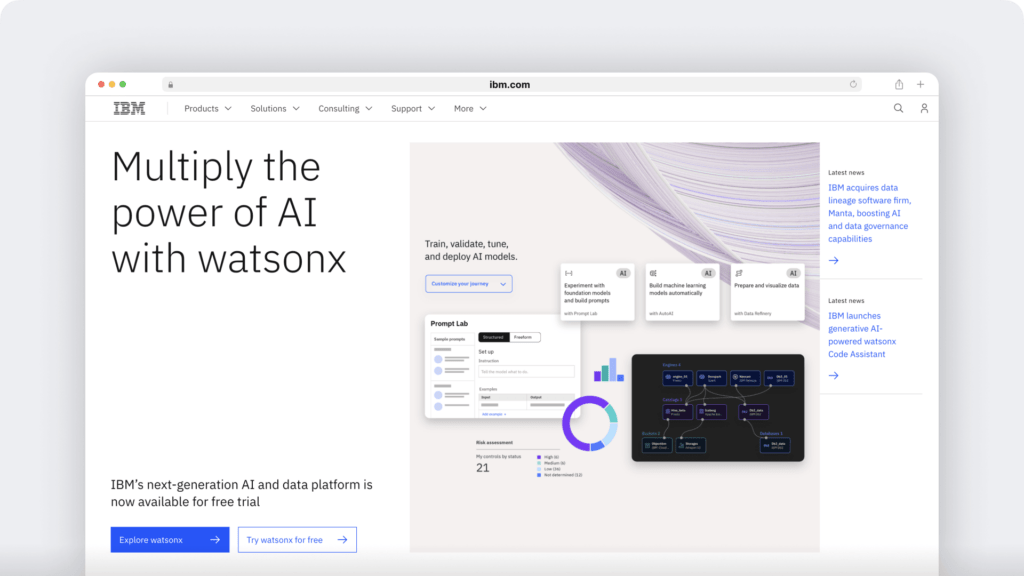
With headquarters in New York, the United States, IBM is a popular information technology outsourcing company. It operates in over 170 countries in the world in Asia, North America, the Middle East, etc. They offer high quality BPO service processes and IT outsourcing across several industries.
The software outsourcing company has recently focused on advanced IT solutions like big data analytics, IoT (Internet of Things), and machine learning.
Major clients: American Airlines, Volkswagen, Paypal, and Amazon
Outsourcing services
- Talent acquisition
- Financial services
- Software development services
- Mobile app development (android, iOS)
- Web application development
10. Accenture

Headquartered in Dublin, Ireland, Accenture can be your potential outsourcing partner. The software outsourcing company has partnered with the likes of Google, Apple, and Microsoft in the past. As part of the Fortune Global 500, Accenture’s clients include three-fourths of the Fortune 500 companies worldwide!
Accenture has been a continuous participant in the Global Outsourcing 100 with over 10 years of experience in the field.
Major clients: World Bank, American Express, 91 companies of the Fortune Global 100
Outsourcing services
- Healthcare utilization management
- Employee and HR services
- E-commerce set-up and sales team
- Web application development
- Support and procurement operations
11. Wipro

Wipro is an India based outsourcing company that provides IT, consulting as well as business process outsourcing services. They work with clients across several industries, from banking and communication to insurance and oil.
Major clients: Airbus, Telenor, Swiss Pharmaceutical
Outsourcing services
- Artificial intelligence
- Product development
- Customer service management
- Web application development
- Digital marketing
12. SupportNinja

Based out of the United States and Philippines, SupportNinja is a cutting edge outsourcing company that lends support to startups and businesses around the world. It offers customer service, content moderation, and back-office support to companies.
Major clients: RVshare, Top Hat, Harvard support
Outsourcing services:
- Data entry
- Image moderation
- Lead mining
13. Outsource Access
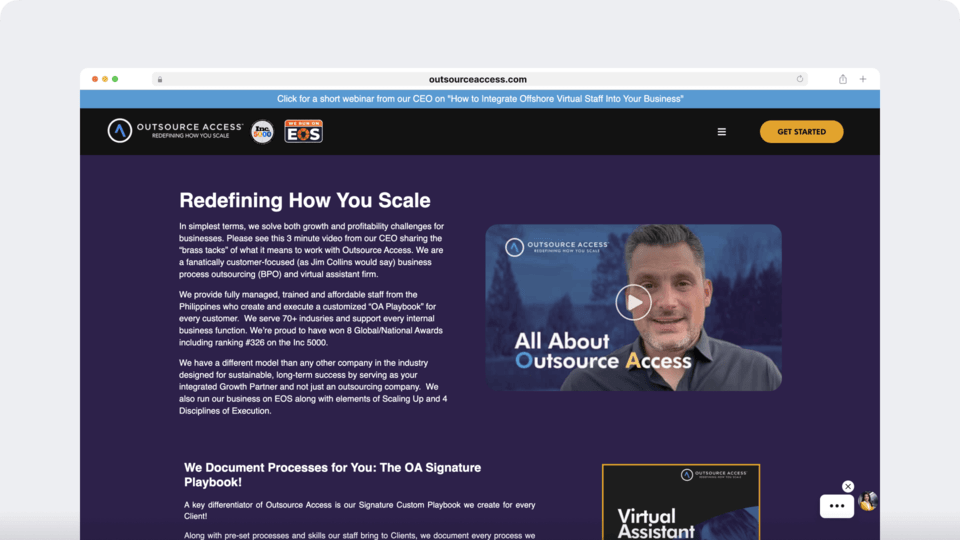
Outsource Access is a BPO company based in Atlanta. It’s a back-end service provider to companies across various industries, from entertainment and hospitality to education.
Outsource Access is the only outsourcing company selected for Inc Magazine’s “Best in Business” award for rapid growth.
Outsourcing services:
- Project management
- Lead generation
- Administrative virtual assistance
14. The Pineapple Corporation

The Pineapple Corporation is a US-based business process outsourcing company that offers automation for all business interactions and other manual work. For this, the company offers an AI digital platform to manage communications with organizations, stakeholders, and customers.
Outsourcing services:
- Enterprise resource planning
- Channel management services (social media, IVR)
- Virtual assistance
15. Go Team
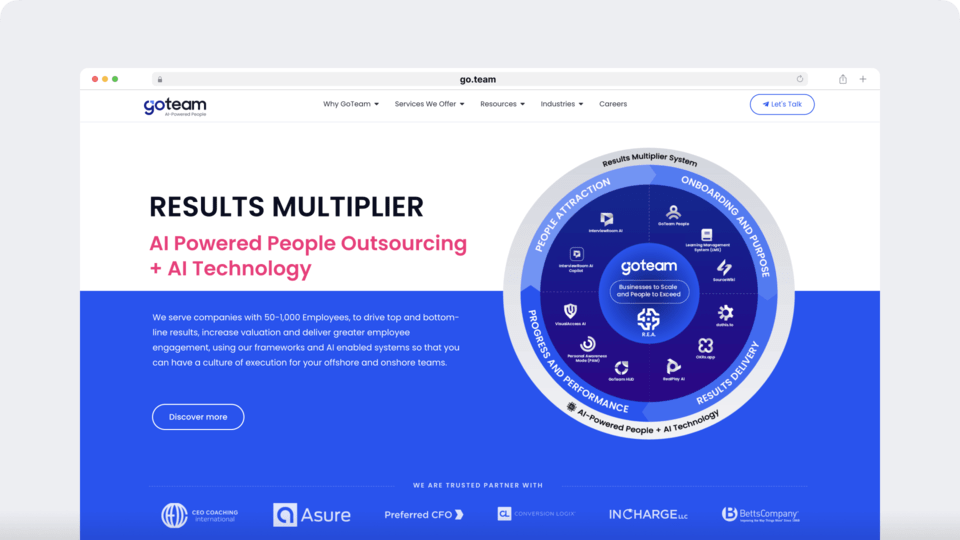
Formerly known as GoVa, GoTeam is an outsourcing company based in the Philippines. It offers an array of services like advertising and legal services.
Major clients: BAM companies, CEO Coaching International
Outsourcing services:
- Digital marketing
- Information Technology support
- Healthcare
16. MedVa

Headquartered in Nevada, MedVa was founded by doctors to optimize patient care and healthcare management. It offers virtual assistants with expertise in the medical and dental fields to assist doctors with their appointments, scheduling, billing, and more.
Major clients: Behavioral health solutions, Certified Advanced Healthcare Providers.
Outsourcing services:
- Medical admin assistant
- Medical scribe
- Billing and claims.
17. 1840 & Company
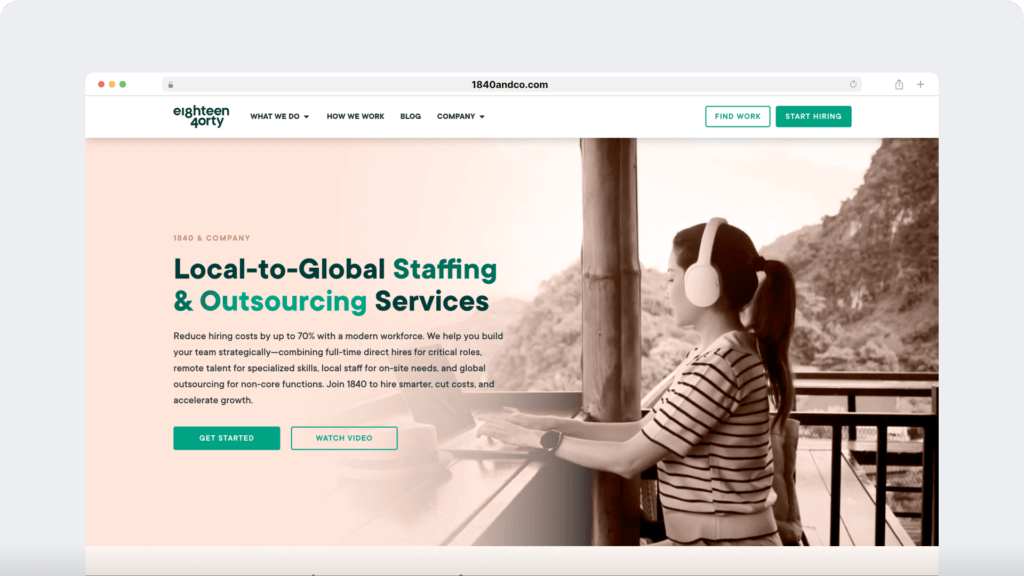
1840 & Company is a local-to-global outsourcing provider that caters to businesses looking for flexible, cost-effective workforce solutions. With operations across 150 countries, they offer a robust set of services tailored to meet global staffing and outsourcing needs. Their proprietary Global Talent Cloud, which combines AI and human expertise, enables rapid, scalable hiring of vetted professionals across multiple industries.
Major clients: VC-backed startups, mid-market companies
Outsourcing services:
- Global remote staffing
- Business process outsourcing (BPO)
- Direct placement
- Employer of Record (EOR) services
- DIY Talent Cloud
1840 & Company excels at reducing hiring costs by up to 70%, making them a preferred partner for growing businesses worldwide.
Choosing between outsourcing companies
With so many options, picking the right outsourcing company for your needs can be very tricky.
To make this process easier, here’s a step-by-step guide to choosing your BPO service provider:
1. List your criteria based on your business requirements
To begin with, list what services you require from an outsourcing partner.
Based on these needs, select the criteria to use while evaluating each BPO company.
These criteria may include:
- Specialization/Area of expertise: What industries does the outsourcing company specialize in?
- Services offered: What outsourcing services do they offer?
- Company size: How large is the company? How many employees do they have?
- Major clients: Who are their biggest clients?
- Pricing: What do their services cost?
Remember to settle on a selection of relevant criteria for your business. For example, if pricing is something that’s extremely important to you, ensure that that’s your chief selection criteria in your evaluation process.
2. Narrow-down your selection
Based on the criteria used in the previous step, shortlist the outsourcing companies that best match your requirements.
Try to narrow your selection down to three to five service providers.
Why three to five?
This gives you enough room to narrow your options further while also eliminating a majority of prospects from your list.
3. Set up a test project
Assign a test project to your shortlisted outsourcing companies. Think of this as a pilot project that can help you evaluate their performance and work.
It’s always a good idea to ensure that your test project closely resembles a project you’d give them if you hire them. This way, you get a better idea of how they’ll be able to cope with the work you’d actually give them if you do hire them.
4. Assess their performance
Rank your potential outsourcing partner contenders based on their performance in the test project.
Use performance benchmarks and metrics to help you out with this.
Some of these could include:
- Time taken to complete the project.
- Quality of work or expertise.
- Ease of communication.
- Adaptability to changes and updates.
When creating a list of evaluation criteria, remember to prioritize what matters most to your business. For example, if your company values timeliness, then “time taken to complete the project” should be one of your list’s most important evaluation criteria.
5. Periodically assess their performance and productivity
A lot of companies might put their best talent on a pilot project to get your business, but that doesn’t necessarily mean that they will continue to deliver the standards you had initially envisioned.
That’s why it’s important to revisit the different performance metrics every quarter to ensure that quality levels don’t fall. This is especially important when you go for an FTE (Full time employee) model where your service provider gives you a dedicated team.
But how do you track your team’s productivity when they don’t work in the same office as you and probably work on a different continent altogether?
Luckily, with a remote productivity tool like Time Doctor, managing outsourced customer service, sales, or developer teams is a piece of cake!
What’s Time Doctor?
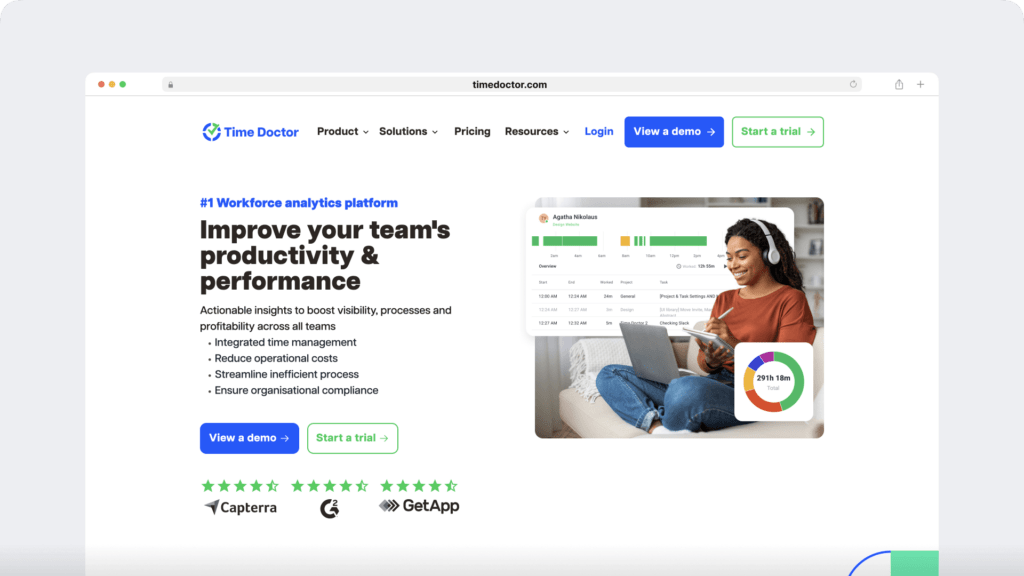
Time Doctor is a powerful remote productivity platform used by SMBs as well as major companies like Ericsson and Keller Williams.
With Time Doctor’s powerful features, you can:
- Track the time your outsourced team takes for each task.
- Monitor unproductive time with idle time tracking.
- Track the websites and apps your outsourced team uses to ensure company policies aren’t violated.
- Generate productivity reports to make team management easier.
- Automate payrolling to outsourcing companies to pay in any currency through integrations like Paypal, Gusto, etc.
Wrapping up
Outsourcing companies play a significant role in virtually every industry today.
You can go through this list to find the outsourcing companies that fit your company’s needs and then go through the process we mentioned to narrow it down to the perfect fit.
Once you do, you’ll have no trouble benefiting from the numerous advantages that outsourcing provides and will be able to take your business to the next level.

Liam Martin is a serial entrepreneur, co-founder of Time Doctor, Staff.com, and the Running Remote Conference, and author of the Wall Street Journal bestseller, “Running Remote.” He advocates for remote work and helps businesses optimize their remote teams.


